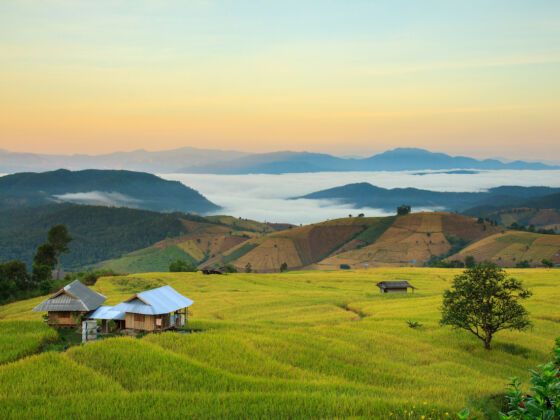In exchange for a few hours of unpaid help per day, WWOOFers are offered free accommodation and meals at organic projects around the world. It’s no lazy holiday however, and WWOOF volunteers can be found doing any number of chores from harvesting rice, to building mud brick ovens, to tromping through duck ponds.

“It’s an opportunity to exchange knowledge and learn from others,” says Lesley from Baan Wasunthara Organic Farm in Chiang Mai. “We enjoy getting to know the travelers who stay with us and the extra help on the farm is a great benefit for us too!”
Many hosts live a sustainable lifestyle that is a source of inspiration for travelers who learn first hand the art of crafts, food production, and farm maintenance.
Currently, there are 15 WWOOF opportunities in Thailand, ranging from small, family run gardens to full-fledged organic farming operations that ship their produce throughout Asia. Because the country does not have its own WWOOF organization, all volunteers are required to sign up with WWOOF Independents.
A one-year membership costs about $30 USD, and you’ll have access to a list of WWOOFing opportunities in over 20 countries. This list is updated regularly, but because many of the farms have been participating in the WWOOF program for a couple of years it doesn’t change frequently.
Once you join WWOOF, you’ll have access to the contact information for each of the farms and their specific requirements. And yes, there are lots of WWOOF lists being circulated on the web, but there is a formal process for applying to a farm that requires membership, so buck up and pay the fee, and help to keep this great organization going.
The majority of WWOOF hosts are located in northern Thailand and offer stunning scenery, lots of opportunities for trekking and exploring, and colorful local culture. When choosing a farm, make sure to do some research, ask lots of questions so you know exactly what you’re getting into, and try to build a bit of a relationship with your host before your arrival.
Here’s a sampling of a few of the great farms that Thailand has to offer.
Big House Organic Farm
Big House Organic Farm offers travelers a quiet setting in rural north eastern Thailand where the focus is on sustainable living, meditation, and yoga. There is no electricity, TV, fridge, or radio, so if it’s chilled-out, back-to-the basics you’re looking for, Big House is just the place.
Work projects include mud brick building, rice planting and harvesting, building a bicycle grain grinder, and solar cooking and baking. The owners have extensive knowledge about sustainable living and anyone looking to incorporate eco-friendly practices into their lifestyle could stand to learn a few things from them.
Lungkahms Jungle Homestay and Farm
A small organic farm located just outside of Chiang Mai, they also run Siam River Tours from the property. This place has a young, backpacker vibe and the restrictions on smoking and alcohol are fairly lax here, but they do still expect a hard day’s work in exchange for room and board.
The location is one of the highlights of this farm since it’s smack dab in the center of national parks, vibrant hill tribe cultures, and tons of outdoor adventure sports. Rafting, kayaking, and jungle canopy tours are offered daily and are something to look forward to during down time. The hosts do request three weeks’ notice, so plan ahead.
Santipap Gardens
Santipap Gardens is a family-run organic farm and learning center located in northeastern Thailand on the shores of Ubanratan Dam Lake.
Aside from the standard vegetable garden and tropical fruit trees, hosts Richard and Pongpen have developed an impressive number of courses for interested guests. Shampoo and dish soap making, Thai cooking lessons, earthen house building, and Thai massage are just a few skills travelers can learn during their stay.
Accommodations are basic and the hosts expect hard work, but if you’re looking for an experience in a rural Thai village, this is a good one to consider. They also allow children and being located in a traditional Thai village makes this farm a family-friendly option.
The Panya Project
The Panya Project is an hour north of Chiang Mai, lost in a complex network of dirt roads, paddy fields, and canals. This 10 acre site is home to one of southeast Asia’s most comprehensive sustainable living communities.
With the help of grant money, the people behind Panya Project have worked since 2006 to turn a mango plantation into a self-sufficient permaculture center, complete with composting toilet systems, water harvesting, seed saving, and an education center.
During the dry months (November-May), work focuses on building earthen structures, teaching courses at the education center, and harvesting from the vegetable garden. June-October bring lots of rain, which is ideal for planting and mulching. Visitors are asked to stay a minimum of two weeks.
Phrao Organic Farm
Located in the village of Ampur Phrao about 100 kilometers north of Chiang Mai, this small, certified organic orchard sells its high-quality fruit throughout Thailand. The farm is surrounded by mountains and is only three kilometers from town.
The owners are enthusiastic about ecotourism and are involved with social improvement projects with local local hill tribes and conservation at Chiang Dao National Park, so there is ample opportunity for cultural exchange, trekking, and exploring.
With more than 1,000 fruit trees, workers can expect to do quite a bit of harvesting, but with endless supply of guava, jack fruit, papaya, dragon fruit, and bananas to munch on throughout the day, a little hard work is a small price to pay. The only restriction is no alcohol or smoking.
Community Connection:
Learn more about Thailand by visiting Matador’s Travel Southeast Asia Focus Page.